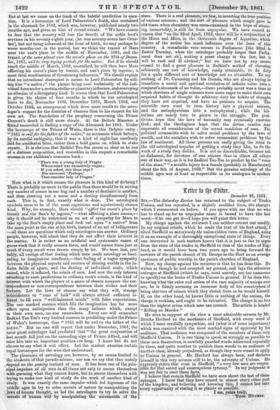Wu to t4 Can.
December 26, 1861. SIR,—The Ralwrday Review has returned to the subject of Trades Unions, and has repeated, in a slightly modified form, the charges which I commented on before. If you agree with me that he who has to stand up for an unpopular cause is bound to have the last word—if he can get it—I hope you will print this letter.
My charge against the reviewer I can neither retract nor modify. In my original article, which he made the text of' his first attack, I cited Sheffield as notoriously the union-ridden town of England, using it as an example of a thoroughly exceptional state of things. Every one interested in such matters knows that it is just as fair to argue from the state of the -trades in Sheffield to that of the trades of Eng- land, as it would have been two years ago to bring forward the services of the parish church of St. George-in-the-East as an avergge specimen of public worship in the parish churches of England. '
Now, my charge against the reviewer is that he has done this. He writes as though he had accepted my ground, and lays the atrocious outrages at Sheffield (which he says, most untruly, are too nuns:ere:is to specify) on the backs of Trades Unions in general. If he does this, knowing what the rules and action of the vast majority of unit now are, he is falsely accusing an immense body of his countrymen of being abettors of crimes which they shrink from as he would himself. If, on the other hand, he knows little or nothing of the unions, the charge is reckless, and ought to be retracted. The charge is nci less than the highest crime which man can commit. The article is headed "Killing no Murder." He cites in support of his view a most admirable sermon by Mr. Brooke lierford to the mechanics of Sheffield, with every word of which I most cordially sympathize, and (what is of more importance) which was received with the most marked signs of approval by his audience. That'audience was composed of the members of these very Sheffield Unions. It is one thing to speak as strongly as possible to these men themselves, in carefully guarded words addressed especially to them, and quite another to publish these words to an audience of =other class, already prejudiced, as though they were meant to apply to Unions in general. Mr. Herford has always been, and declares himself in this very sermon still to be, the advocate of Unions. He expressly states that. even in Sheffield, "a very few men are respon sible for that secret and unscrupulous tyranny.' In my judgment it was not fair to omit these facts. I believe that even in Sheffield we have seen about the last of these outrages. I know that they have ceased in almost every other part of the kingdom, and believing and knowing this, I cannot but take every opportunity of stating it as plainly as possible.
I am, yours truly,
Taos. HUMES.




























 Previous page
Previous page